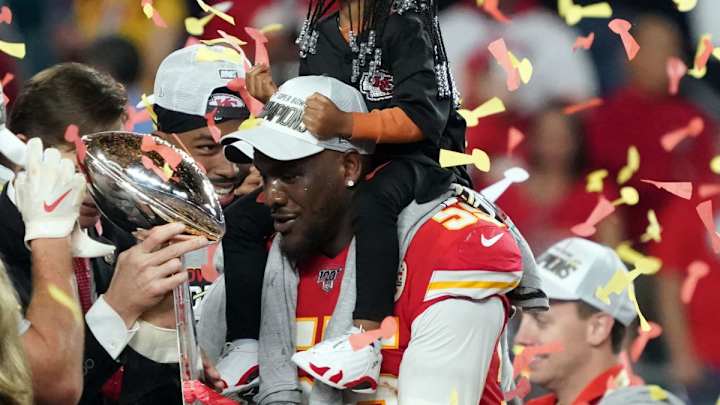Playing in Second Straight Super Bowl, Former Seahawks DE Frank Clark Left a Great Situation for the Very Best

When the Chiefs and Buccaneers take the field at Raymond James Stadium in Tampa, Florida for Super Bowl LV this Sunday, Seahawks fans will be hard-pressed to find many familiar faces. Of the two former Seahawks on either roster, only one is expected to be active: Kansas City defensive end Frank Clark.
One of Seattle's better "draft hits" in recent memory, Clark has been a member of two of the most prestigious NFL franchises over the last decade. Coming into the league immediately after the Seahawks' infamous heartbreaking loss to Tom Brady and the Patriots in Super Bowl XLIX, Clark - now as a member of another organization looking to repeat against a Brady-led team - has a chance to win his second championship in as many seasons.
Though Clark became the Seahawks' top pass-rushing option by the end of the 2018 season, he was well on his way to a payday that would prove too expensive for coach Pete Carroll and general manager John Schneider to sign off on. The team wound up placing the franchise tag on him on March 4, 2019 and eventually traded him a little over a month later.
Coming to an agreement with the Chiefs, Seattle hauled in a 2019 first-round pick and a 2020 second-round pick, and swapped third-round selections as well. Meanwhile, Clark moved on to a Kansas City organization poised to win its first Super Bowl in 50 years, signing a five-year, $105.5 million extension with them the day of the trade.
Many Seahawks fans were pleased with the trade for reasons far greater than football. It would be incredibly irresponsible to write anything about Clark without mentioning his history of domestic violence and blatant misogyny towards Natalie Weiner—both of which are forever burned into the brains of those aware of his actions. While several NFL teams will go to great lengths to ignore a talented player's vileness, such things will never fully cease to follow those like Clark, which ultimately makes his accomplishments in Kansas City tougher to swallow for some.
From a football perspective, the Seahawks made out well in the trade even though the past two seasons have been a whirlwind of success for Clark and the Chiefs. Not only did the deal free up precious salary cap space and directly lead to the selections of guard Damien Lewis and defensive ends L.J. Collier and Alton Robinson, it also allowed Seattle to trade its other first-round pick in 2019 to accumulate more draft capital in a deep class.
Selecting Collier with the No. 29 pick that came from the Chiefs, the Seahawks worked their way down from their own first-rounder at No. 21 all the way to No. 47 over the course of three trades. With the help of the picks gained from those deals, Seattle selected receivers DK Metcalf and Gary Jennings, defensive backs Marquise Blair and Ugo Amadi, linebacker Ben Burr-Kirven, and running back Travis Homer. They would also trade the No. 92 selection, acquired from Kansas City in the Clark deal as well, to move up four spots to take linebacker Cody Barton.
That's not the only reason Schneider and Carroll have to feel good about making the decision to trade Clark when they did. So far, the Chiefs have seen disappointing statistical returns on a player that's currently accounting for nearly $26 million in cap space on their books in 2021. Clark has turned in two of his three lowest sack totals since coming to Kansas City, and in 2020 he posted Pro Football Focus grades in the low 50s across the board and logged just 6.0 sacks in 15 starts.
Though frustrating, all that likely matters to Clark is that he's winning considerably more than he did in Seattle while being handsomely paid along the way.
Too often when analyzing trades is it lost that neither team has to win or lose. It's not a game, but a means to mutually benefit both parties—most of the time, at least. Except, it's not just the teams who should be looked at in these situations, but the players as well. The Seahawks did very well in this deal, as did the Chiefs. But so did Clark, who's one win away from adding yet another ring to his collection despite a pair of underwhelming seasons from a personal production standpoint.

Reporter and editor covering the Seattle Seahawks for All Seahawks. Host of Locked On Mariners.
Follow danegnzlz